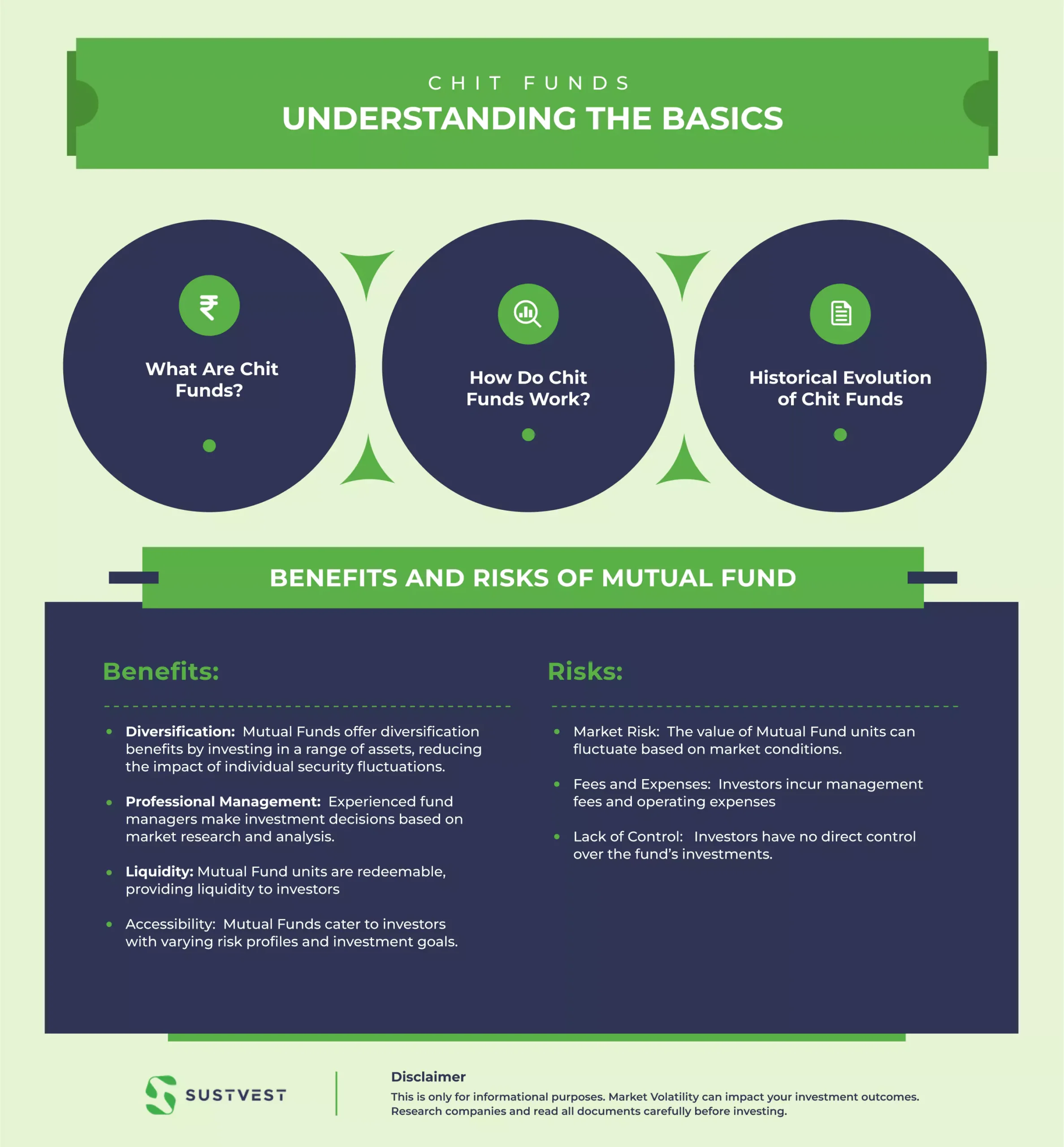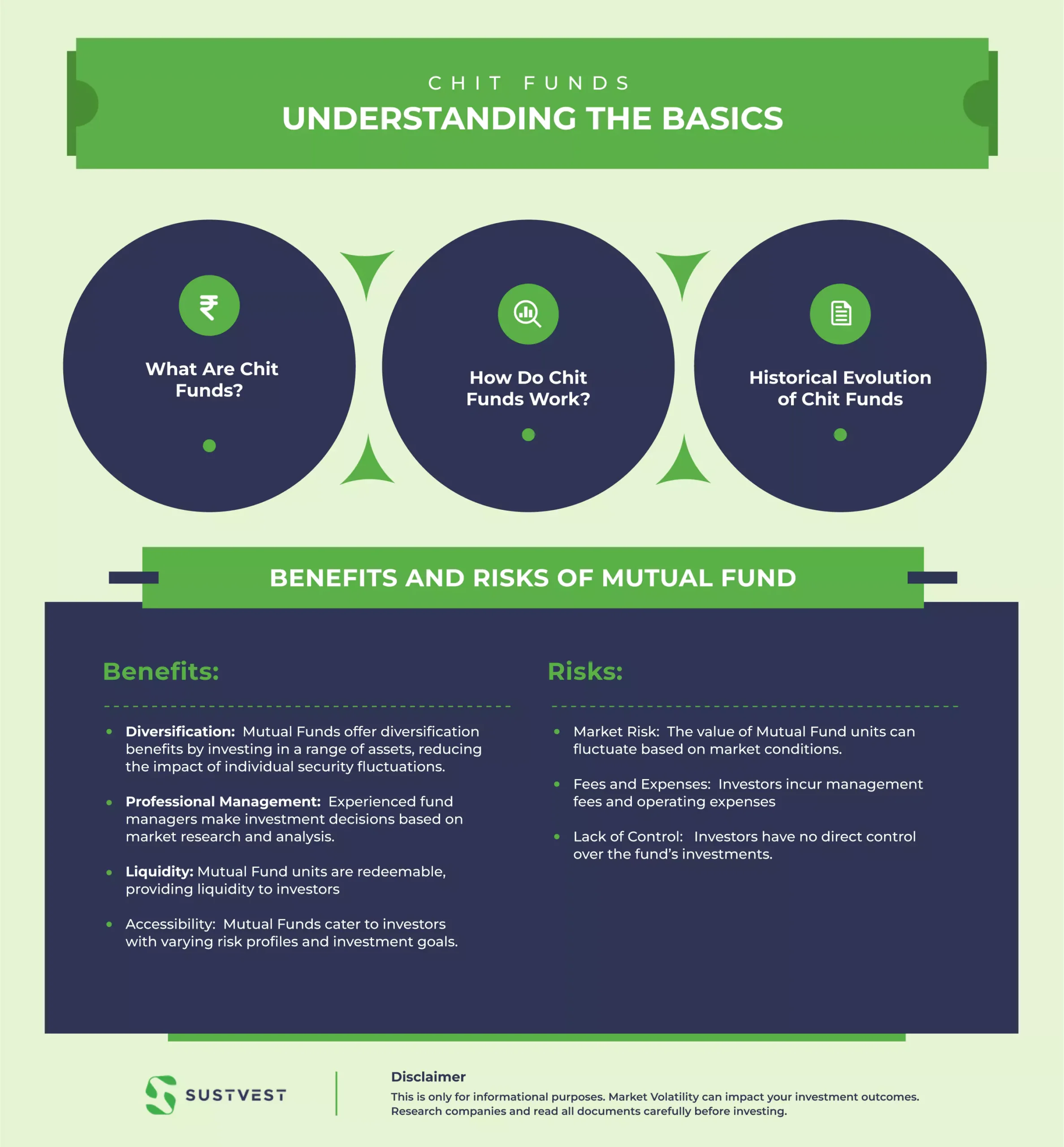Introduction
In the intricate world of finance, making informed investment decisions is pivotal for securing your financial future. Two investment options that often pique interest and generate debate are Chit Funds vs. Mutual Funds. Despite sounding somewhat similar, these financial instruments serve vastly different purposes and come with their unique set of advantages and risks.
In this comprehensive guide, our journey will take us through a thorough examination of Chit Funds vs. Mutual Funds, aiming to provide a clear understanding of their definitions, the advantages they offer, and the associated risks. Furthermore, we will also delve into the significance of alternative energy investments and how they contribute positively to our environment.

Chit Funds: Understanding the Basics
What Are Chit Funds?
Chit Funds, which means chitty or kuri in some regions, are a traditional form of financial savings and borrowing in India. They operate as a unique savings scheme where a group of individuals, known as subscribers or members, come together to contribute a fixed amount regularly. Chit fund means a pool of funds, which is then disbursed to one member through an auction or lottery system. This process continues until all members receive their share of the fund.
How Do Chit Funds Work?
Chit Funds operate on a predetermined time frame, usually ranging from a few months to several years. Each member contributes a fixed amount, and during each cycle, one member is selected to receive the entire sum. This process repeats until all members have received their share of the fund. Chit Funds are typically managed by a chit fund company or an individual known as the foreman.
Historical Evolution of Chit Funds
Chit Funds have a rich historical legacy in India, dating back to the 17th century. They were traditionally organized within communities to help members save for specific financial goals, such as weddings, home purchases, or emergencies. Over time, Chit Funds evolved and gained recognition as a formal financial instrument regulated by state governments.

Mutual Funds: A Diverse Investment Landscape
What Are Mutual Funds?
Mutual Funds serve as expertly managed investment options where capital from a multitude of investors is pooled together for the purpose of investing in a diversified portfolio. This portfolio typically comprises stocks, bonds, or various other securities. The seasoned fund managers are responsible for the benefits and risks and they aim to maximise returns for investors while prudently managing associated risks.
Types of Mutual Funds
There is a wide variety of mutual fund benefits and risks available to investors, catering to different risk appetites and investment objectives. Some common types include equity funds, debt funds, hybrid funds, and index funds. Each type serves a specific purpose, from seeking capital appreciation to providing stable income.
Benefits and Risks of Mutual Fund
Benefits:
- Diversification: Mutual Funds offer diversification benefits by investing in a range of assets, reducing the impact of individual security fluctuations.
- Professional Management: Experienced fund managers make investment decisions based on market research and analysis.
- Liquidity: Mutual Fund units are redeemable, providing liquidity to investors
- Accessibility: Mutual Funds cater to investors with varying risk profiles and investment goals.
Risks:
- Market Risk: The value of Mutual Fund units can fluctuate based on market conditions.
- Fees and Expenses: Investors incur management fees and operating expenses
- Lack of Control: Investors have no direct control over the fund’s investments.
Chit Funds vs. Mutual Funds: A Comparative Analysis
Key Differences
1. Nature of Investment: chit fund vs. mutual fund
Chit Funds involve a group of savings-cum-borrowing models.
Mutual Funds are investment vehicles collectively managed by a team of financial experts.
2. Returns:
Chit Funds offer returns through auctions, which may not guarantee fixed returns.
Mutual Funds aim to provide returns based on the performance of the underlying assets.
3. Risk Profile:
Chit Funds can be riskier as the returns depend on the auction process.
Mutual Fund’s benefits and risks vary based on the assets held but generally offer more diversification.
4. Regulation: chit fund vs. mutual fund
Chit Funds are regulated by state governments.
Mutual Funds are subject to oversight and regulation by the Securities and Exchange Board of India (SEBI).
Risk and Return Profiles
It’s crucial to recognize that, in the realm of Chit Funds vs. mutual funds there exists the potential for payouts that might not meet your initial expectations, introducing an element of uncertainty. In contrast, Mutual Funds have earned their reputation for their risk-diversification approach, often delivering more dependable and consistent returns over the long haul.
Liquidity Considerations
Chit Funds may lack liquidity, as subscribers must commit to the predetermined payment schedule. Exiting a Chit Fund prematurely can result in penalties or loss of bidding opportunities. Chit funds vs. Mutual Funds, on the other hand, offer greater liquidity, with units that can be bought or sold on any business day.

Enhancing Chit Fund vs Mutual Fund in India: A Path to Progress
Challenges Faced by Chit Funds
While Chit Funds have a long history in India, they face certain challenges, including a lack of awareness, transparency issues, and regulatory hurdles. These challenges can hinder their growth and accessibility for potential investors.
Suggestions for Improvement
To enhance the functioning of Chit Fund vs. mutual fund in India, several steps can be taken
- Education and Awareness:
Initiatives to educate potential investors about Chit Funds and their benefits.
- Transparency:
Implementing transparency measures to build trust among subscribers.
- Digitalization:
Embracing technology to streamline operations and reduce paperwork.
- Regulatory Support:
Collaboration between regulators and Chit Fund companies to create a conducive environment.
“Powering Your Prosperity: Shine with Solar Bonds and Green Energy Funds”
Consider Solar Bonds:
Certain organizations issue bonds specifically to fund projects because solar energy benefits the environment. This might involve backing community solar installations or contributing to solar farm developments. These types of investments can yield attractive returns while actively participating in the generation of clean energy.
Explore Green Energy Funds:
Another avenue to consider is green energy funds. These funds allocate investments across various renewable energy sources like wind, solar, and hydropower. This diversified approach allows you to spread your investment across different green technologies, reducing risk while supporting clean energy growth like solar energy benefits the environment.
FAQs :
Q1: What do Chit Funds mean?
A1: Chit Funds are savings and credit institutions where a group of individuals pool money periodically, with each member having the chance to receive the entire collected sum once during the cycle.
Q2: What are the benefits and risks of Mutual Funds?
A2: Mutual Funds benefits and risks offer professional management, diversification, and liquidity but come with market risk, fees, and no guaranteed returns.
Q3: Should I invest in alternative energy mutual funds?
A3: Investing in alternative solar energy benefits the environment because mutual funds can align with environmental goals as well to provide diversification, but investors should consider the associated risks.
Conclusion: Making Informed Investment Choices
In the quest for financial growth, individuals often find themselves at a crossroads, contemplating various investment avenues. Chit Funds vs. Mutual Funds are two distinct options, each with its own set of advantages and risks. While Chit Funds offers a traditional and community-driven approach, Mutual Funds provide diversification and professional management.
When deciding between these options, it’s essential to consider your financial goals, risk tolerance, and investment horizon of chit fund vs. mutual fund . Additionally, exploring sustainable investments like solar energy can align your financial objectives with the greater good of the environment. Get in touch with Sustvest today for making an informed financial decision.

Founder of Sustvest
Hardik completed his B.Tech from BITS Pilani. Keeping the current global scenario, the growth of renewable energy in mind, and people looking for investment opportunities in mind he founded SustVest ( formerly, Solar Grid X ) in 2018. This venture led him to achieve the ‘Emerging Fintech Talent of the Year in MENA region ‘ in October 2019.




